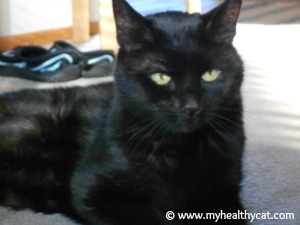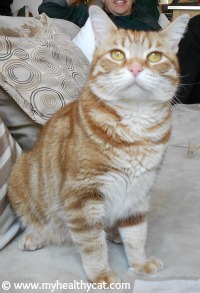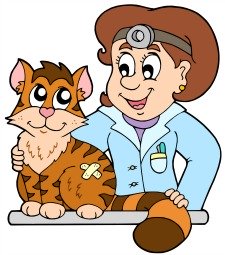What Are the Most Common
Cat Health Problems?
Common cat health problems range from simple inconveniences to life-threatening accidents and illnesses.
If You Think Your Cat is Sick...
If you notice anything unusual or unusual behavior in your cat or kitten (especially things like not eating, constipation, lethargy, or a dull coat), I highly recommend that you contact your veterinarian.
Your kitty may be sick and may need immediate veterinary care; it's often difficult to diagnose problems on your own, no matter how many websites one visits!

Symptoms of Illness
Here are some signs that something may be wrong with your feline friend's health:
- loss of appetite
- a dull coat
- excessive grooming or itching
- not grooming after eating
- lethargy
- hiding in unusual places (i.e., places your cat normally doesn't hide)
- vomiting
- diarrhea
- appearance of the third eyelid extending from the corner of your cat's eyes while awake
- difficulty using the litter box or using another location for elimination when your kitty usually uses her litter box
- excessive drooling
- drinking lots and lots of water, or
- any other behavior that seems unusual for your cat.
 Garbo "I'm ready for my close-up!"
Garbo "I'm ready for my close-up!"This is not an exhaustive list of all the possible symptoms of kitten or common cat health problems; just the basics.
You also need to know your cat and know his or her regular behavior.
If something seems "off" to you, there may be a problem.
Get Educated about Your Kitty's Health
If you're a new cat "owner," it's a really good idea to get as much information as you can about feline behavior and health.
Local animal shelters, and rescue organizations, often offer classes to help you get to know your kitty better, as well as how to train your cat, and make adjustments in your home for your new feline friend. It is so sad the number of cats who are delivered to shelters from frustrated new owners who don't know how to properly train their cats and kittens.
Consult Your Veterinarian
If you suspect something is wrong with your kitty, you should consult a veterinarian immediately.
There is no way for you to know the extent of the problem with your cat or kitten without having a vet take a look.
And you really should consult your vet as soon as possible to avoid a possible minor problem from becoming more serious. For example, if your cat refuses to eat due to a minor concern, it can lead to a serious health problem called hepatic lipidosis (a liver disease).
If your kitty refuses to eat anything for more than 24 hours, call your veterinarian right away.
List of Common Cat Health Problems
Here's a partial list of common cat health problems:
Cat Hairballs
Cat hairballs (also written or called hair balls, furballs or fur balls) are a very common problem many felines have. You've obviously seen how your kitty grooms himself or herself by licking his or her fur (and you may have wondered where it all goes!).
A hairball is an excess of fur that accumulates in the stomach. Usually, your cat can eliminate the excessive hair either through feces or through vomiting up the hairball.
Here's a page with more information about cat hairballs.
You can also read more information on treatment for cat hairballs here.
Fleas
Fleas are an external parasite that can cause a myriad of common cat health problems in your cat or kitten, including anemia and tapeworm infection.
Start at our flea control page to get all the information you need about fleas, what they can do to your cat or kitten's health, and how to get rid of fleas.
Plant Poisoning
Kitties like to chew on green things! Certain indoor and outdoor plants, and even the insecticides on the plants, can poison your cat.
Our plants poisonous to cats page provides more information.
Worms in Cats
Worms are also parasites that can affect your cat's health. Cats and kittens can get all types of worms:
- ringworm, (which is actually a fungus, not a worm)
- roundworms,
- hookworms,
- lungworms, and
- tapeworms.
For more info, see My Healthy Cat's worms in cats page.
If you already know your cat has tapeworm, go directly to my tapeworm treatment page.
You should also know about which worms from your cat you can get.
Viral and Other Infections
More serious infections that can plague your cat or kitten include feline infectious enteritis, rabies, and cat flu.
There's also feline immunodeficiency virus (FIV), feline infectious peritonitis (FIP), and the feline leukemia virus (FeLV).
All of these are more serious diseases and you should consult with your veterinarian about vaccinations and/or treatment.
Miscellaneous Cat Health Issues
 My beautiful little Neko
My beautiful little NekoJust as with healthy humans, healthy cats are susceptible to a multitude of different health issues.
They can develop digestive problems, urinary problems, respiratory problems, skin problems, etc.
They can also suffer a number of other problems like road accidents, heat stroke, electric shock, falls, and other wounds.
Having a feline or pet first-aid kit handy, as well as your veterinarian's phone number and an emergency pet hospital number available, is a wise thing to do to take care of all of your pets.
What about Pet Insurance for Common Cat Health Problems?
Some common cat health problems can be solved with basic things like a change in diet or over-the-counter cat medicine. Others can require extensive and expensive visits to your veterinarian.
If you're considering insurance, see our pet insurance tips page to help you decide if this investment is right for you and your kitty.
Disclaimer—Consult a Vet!

Please note that the information provided on this page and in this whole website is only information.
I am not veterinarian and I cannot provide a diagnosis or treatment for your kitty.
If you suspect that your cat or kitten is sick, please contact your veterinarian immediately. Waiting isn't only bad for your pet's health, but could also end up costing you a lot more in veterinary bills.
Use the Search Box to find more feline info. |
From Common Cat Health Problems to My Healthy Cat home
If you suspect your cat is ill, please contact your veterinarian immediately.
The material presented in this site is for informational and entertainment purposes only. It is not intended to replace your veterinarian's advice.
Copyright 2003-2025 © www.myhealthycat.com
Sitemap | Contact Us | About Us | Disclosure | Privacy Policy

